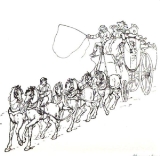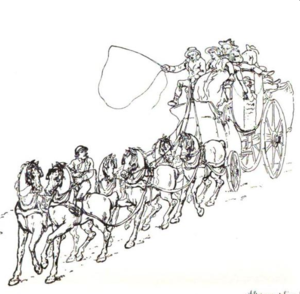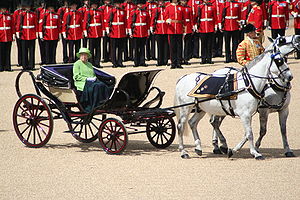
Postilion
Encyclopedia


Coach (carriage)
A coach was originally a large, usually closed, four-wheeled carriage with two or more horses harnessed as a team, controlled by a coachman and/or one or more postilions. It had doors in the sides, with generally a front and a back seat inside and, for the driver, a small, usually elevated seat in...
or post chaise, mounted on one of the drawing horse
Horse
The horse is one of two extant subspecies of Equus ferus, or the wild horse. It is a single-hooved mammal belonging to the taxonomic family Equidae. The horse has evolved over the past 45 to 55 million years from a small multi-toed creature into the large, single-toed animal of today...
s. By contrast, a coachman
Coachman
A coachman is a man whose business it is to drive a coach, a horse-drawn vehicle designed for the conveyance of more than one passenger — and of mail — and covered for protection from the elements...
would be mounted on the vehicle along with the passengers.
Postilion riders normally rode the left (or "near") horse of a pair because horses usually were trained only to be mounted from the left. With a double team, either there would be two postilions, one for each pair, or one postilion would ride on the left rear horse in order to control all four horses.
This style of travel was known as "posting",. The postilions and their horses (known as "post-horses") would be hired from a "postmaster" at a "post house". The carriage would travel from one post house to the next (a journey known as a "stage"), where the postilions and/or horses could be replaced if necessary. Posting was once common both in England and in continental Europe. In England, however, it declined once railways became an alternative method of transport. It remained popular in France
France
The French Republic , The French Republic , The French Republic , (commonly known as France , is a unitary semi-presidential republic in Western Europe with several overseas territories and islands located on other continents and in the Indian, Pacific, and Atlantic oceans. Metropolitan France...
and other countries.
See also
- Le postillon de LonjumeauLe postillon de LonjumeauLe postillon de Lonjumeau is an opéra-comique in three acts by Adolphe Adam to a French libretto by 'Adolphe de Leuven' and 'Brunswick' ....
, an 1836 French comic opera by Adolphe AdamAdolphe AdamAdolphe Charles Adam was a French composer and music critic. A prolific composer of operas and ballets, he is best known today for his ballets Giselle and Le corsaire , his operas Le postillon de Lonjumeau , Le toréador and Si j'étais roi , and his Christmas...
. - "My postillion has been struck by lightningMy postillion has been struck by lightning"My postillion has been struck by lightning", "Our postillion has been struck by lightning", and other variations on the same pattern, are often given as examples of the ridiculous phrases supposed to have been found in phrase books or language instruction in the nineteenth and twentieth century...
". A comical phrase supposedly found in old-fashioned foreign language phrase books.

